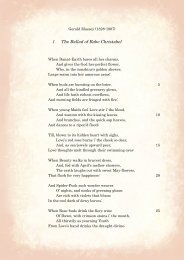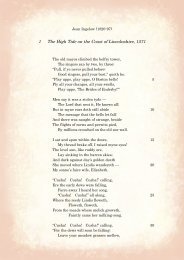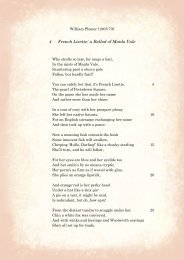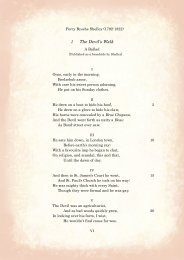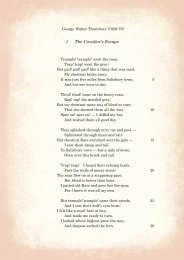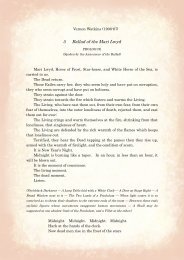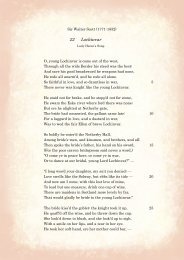14 The Noble Moringer
14 The Noble Moringer
14 The Noble Moringer
Create successful ePaper yourself
Turn your PDF publications into a flip-book with our unique Google optimized e-Paper software.
Sir Walter Scott (1771-1832)<br />
<strong>14</strong> <strong>The</strong> <strong>Noble</strong> <strong>Moringer</strong><br />
An Ancient Ballad.<br />
Translated from the German.<br />
<strong>The</strong> original of these verses occurs in a collection of German popular songs, entitled,<br />
Sammlung Deutschen Volkslieder, Berlin, 1807, published by Messrs. Busching and Von<br />
der Hagen, both, and more especially the last, distinguished for their acquaintance with the<br />
ancient popular poetry and legendary history of Germany.<br />
In the German Editor’s notice of the ballad, it is stated to have been extracted from a<br />
manuscript Chronicle of Nicolaus Thomann, chaplain to Saint Leonard in Weisenhorn,<br />
which bears the date 1533; and the song is stated by the author to have been generally<br />
sung in the neighbourhood at that early period. Thomann, as quoted by the German<br />
Editor, seems faithfully to have believed the event he narrates. He quotes tombstones and<br />
obituaries to prove the existence of the personages of the ballad, and discovers that there<br />
actually died, on the 11th May 1349, a Lady Von Neuffen, Countess of Marstetten, who was,<br />
by birth, of the house of <strong>Moringer</strong>. This lady he supposes to have been <strong>Moringer</strong>’s<br />
daughter, mentioned in the ballad. He quotes the same authority for the death of<br />
Berckhold Von Neuffen, in the same year. <strong>The</strong> editors, on the whole, seem to embrace the<br />
opinion of Professor Smith of Ulm, who, from the language of the ballad, ascribes its date to<br />
the 15th century.<br />
<strong>The</strong> legend itself turns on an incident not peculiar to Germany, and which, perhaps, was<br />
not unlikely to happen in more instances than one, when crusaders abode long in the Holy<br />
Land, and their disconsolate dames received no tidings of their fate. A story, very similar<br />
in circumstances, but without the miraculous machinery of Saint Thomas, is told of one of<br />
the ancient Lords of Haigh-hall in Lancashire, the patrimonial inheritance of the late<br />
Countess of Balcarras; and the particulars are represented on stained glass upon a window<br />
in that ancient manor-house.<br />
O, will you hear a knightly tale of old Bohemian day,<br />
It was the noble <strong>Moringer</strong> in wedlock bed he lay;<br />
He halsed and kiss’d his dearest dame, that was as sweet as May,<br />
And said, “Now, lady of my heart, attend the words I say.<br />
I.
II.<br />
“’Tis I have vow’d a pilgrimage unto a distant shrine, 5<br />
And I must seek Saint Thomas-land, and leave the land that’s mine;<br />
Here shalt thou dwell the while in state, so thou wilt pledge thy fay,<br />
That thou for my return wilt wait seven twelvemonths and a day.”<br />
<strong>The</strong>n out and spoke that Lady bright, sore troubled in her cheer,<br />
III.<br />
“Now tell me true, thou noble knight, what order takest thou here; 10<br />
And who shall lead thy vassal band, and hold thy lordly sway,<br />
And be thy lady’s guardian true when thou art far away?”<br />
Out spoke the noble <strong>Moringer</strong>, “Of that have thou no care,<br />
<strong>The</strong>re’s many a valiant gentleman of me holds living fair;<br />
IV.<br />
<strong>The</strong> trustiest shall rule my land, my vassals and my state, 15<br />
And be a guardian tried and true to thee, my lovely mate.<br />
“As Christian-man, I needs must keep the vow which I have plight,<br />
When I am far in foreign land, remember thy true knight;<br />
And cease, my dearest dame, to grieve, for vain were sorrow now,<br />
But grant thy <strong>Moringer</strong> his leave, since God hath heard his vow.” 20<br />
It was the noble <strong>Moringer</strong> from bed he made him boune,<br />
And met him there his Chamberlain, with ewer and with gown:<br />
He flung the mantle on his back, ’twas furr’d with miniver,<br />
He dipp’d his hand in water cold, and bathed his forehead fair.<br />
V.<br />
VI.<br />
VII.<br />
“Now hear,” he said, “Sir Chamberlain, true vassal art thou mine, 25<br />
And such the trust that I repose in that proved worth of thine,<br />
For seven years shalt thou rule my towers, and lead my vassal train,<br />
And pledge thee for my Lady’s faith till I return again.”
VIII.<br />
<strong>The</strong> Chamberlain was blunt and true, and sturdily said he,<br />
“Abide, my lord, and rule your own, and take this rede from me; 30<br />
That woman’s faith ’s a brittle trust — Seven twelvemonths didst<br />
thou say?<br />
I’ll pledge me for no lady’s truth beyond the seventh fair day.”<br />
<strong>The</strong> noble Baron turn’d him round, his heart was full of care,<br />
His gallant Esquire stood him nigh, he was Marstetten’s heir,<br />
IX.<br />
To whom he spoke right anxiously, “Thou trusty squire to me, 35<br />
Wilt thou receive this weighty trust when I am o’er the sea?<br />
“To watch and ward my castle strong, and to protect my land,<br />
And to the hunting or the host to lead my vassal band;<br />
And pledge thee for my Lady’s faith till seven long years are gone,<br />
And guard her as Our Lady dear was guarded by Saint John.” 40<br />
Marstetten’s heir was kind and true, but fiery, hot, and young,<br />
And readily he answer made with too presumptuous tongue;<br />
“My noble lord, cast care away, and on your journey wend,<br />
And trust this charge to me until your pilgrimage have end.<br />
X.<br />
XI.<br />
XII.<br />
“Rely upon my plighted faith, which shall be truly tried, 45<br />
To guard your lands, and ward your towers, and with your vassals ride;<br />
And for your lovely Lady’s faith, so virtuous and so dear,<br />
I’ll gage my head it knows no change, be absent thirty year.”<br />
XIII.<br />
<strong>The</strong> noble <strong>Moringer</strong> took cheer when thus he heard him speak,<br />
And doubt forsook his troubled brow, and sorrow left his cheek; 50<br />
A long adieu he bids to all — hoists topsails, and away,<br />
And wanders in Saint Thomas-land seven twelvemonths and a day.
XIV.<br />
It was the noble <strong>Moringer</strong> within an orchard slept,<br />
When on the Baron’s slumbering sense a boding vision crept;<br />
And whisper’d in his ear a voice, “’Tis time, Sir Knight, to wake, 55<br />
Thy lady and thy heritage another master take.<br />
XV.<br />
“Thy tower another banner knows, thy steeds another rein,<br />
And stoop them to another’s will thy gallant vassal train;<br />
And she, the Lady of thy love, so faithful once and fair,<br />
This night within thy fathers’ hall she weds Marstetten’s heir.” 60<br />
XVI.<br />
It is the noble <strong>Moringer</strong> starts up and tears his beard,<br />
“Oh would that I had ne’er been born! what tidings have I heard!<br />
To lose my lordship and my lands the less would be my care,<br />
But, God! that e’er a squire untrue should wed my Lady fair.<br />
XVII.<br />
“O good Saint Thomas, hear,” he pray’d, “my patron Saint art thou, 65<br />
A traitor robs me of my land even while I pay my vow!<br />
My wife he brings to infamy that was so pure of name,<br />
And I am far in foreign land, and must endure the shame.”<br />
XVIII.<br />
It was the good Saint Thomas, then, who heard his pilgrim’s prayer,<br />
And sent a sleep so deep and dead that it o’erpower’d his care; 70<br />
He waked in fair Bohemian land outstretch’d beside a rill,<br />
High on the right a castle stood, low on the left a mill.<br />
XIX.<br />
<strong>The</strong> <strong>Moringer</strong> he started up as one from spell unbound,<br />
And dizzy with surprise and joy gazed wildly all around;<br />
“I know my fathers’ ancient towers, the mill, the stream I know, 75<br />
Now blessed be my patron Saint who cheer’d his pilgrim’s woe!”<br />
XX.
He leant upon his pilgrim staff, and to the mill he drew,<br />
So alter’d was his goodly form that none their master knew;<br />
<strong>The</strong> Baron to the miller said, “Good friend, for charity,<br />
Tell a poor palmer in your land what tidings may there be?” 80<br />
XXI.<br />
<strong>The</strong> miller answered him again, “He knew of little news,<br />
Save that the Lady of the land did a new bridegroom choose;<br />
Her husband died in distant land, such is the constant word,<br />
His death sits heavy on our souls, he was a worthy Lord.<br />
XXII.<br />
“Of him I held the little mill which wins me living free, 85<br />
God rest the Baron in his grave, he still was kind to me!<br />
And when Saint Martin’s tide comes round, and millers take their toll,<br />
<strong>The</strong> priest that prays for <strong>Moringer</strong> shall have both cope and stole.”<br />
XXIII.<br />
It was the noble <strong>Moringer</strong> to climb the hill began,<br />
And stood before the bolted gate a woe and weary man; 90<br />
“Now help me, every saint in heaven that can compassion take,<br />
To gain the entrance of my hall this woful match to break.”<br />
XXIV.<br />
His very knock it sounded sad, his call was sad and slow,<br />
For heart and head, and voice and hand, were heavy all with woe;<br />
And to the warder thus he spoke; “Friend, to thy Lady say, 95<br />
A pilgrim from Saint Thomas-land craves harbour for a day.<br />
XXV.<br />
“I’ve wander’d many a weary step, my strength is wellnigh done,<br />
And if she turn me from her gate I’ll see no morrow’s sun;<br />
I pray, for sweet Saint Thomas’ sake, a pilgrim’s bed and dole,<br />
And for the sake of <strong>Moringer</strong>’s, her once-loved husband’s soul.” 100<br />
XXVI.<br />
It was the stalwart warder then he came his dame before,
“A pilgrim, worn and travel-toil’d, stands at the castle-door;<br />
And prays, for sweet Saint Thomas’ sake, for harbour and for dole,<br />
And for the sake of <strong>Moringer</strong>, thy noble husband’s soul.”<br />
XXVII.<br />
<strong>The</strong> Lady’s gentle heart was moved, “Do up the gate,” she said, 105<br />
“And bid the wanderer welcome be to banquet and to bed;<br />
And since he names my husband’s name, so that he lists to stay,<br />
<strong>The</strong>se towers shall be his harbourage a twelvemonth and a day.”<br />
XXVIII.<br />
It was the stalwart warder then undid the portal broad,<br />
It was the noble <strong>Moringer</strong> that o’er the threshold strode; 110<br />
“And have thou thanks, kind heaven,” he said, “though from a man of sin,<br />
That the true lord stands here once more his castle-gate within.”<br />
XXIX.<br />
<strong>The</strong>n up the halls paced <strong>Moringer</strong>, his step was sad and slow;<br />
It sat full heavy on his heart, none seem’d their Lord to know;<br />
He sat him on a lowly bench, oppress’d with woe and wrong, 115<br />
Short space he sat, but ne’er to him seem’d little space so long.<br />
XXX.<br />
Now spent was day, and feasting o’er, and come was evening hour,<br />
<strong>The</strong> time was nigh when new-made brides retire to nuptial bower;<br />
“Our castle’s wont,” a brides-man said, “hath been both firm and long,<br />
No guest to harbour in our halls till he shall chant a song.” 120<br />
XXXI.<br />
<strong>The</strong>n spoke the youthful bridegroom there as he sat by the bride,<br />
“My merry minstrel folk,” quoth he, “lay shalm and harp aside;<br />
Our pilgrim guest must sing a lay, the castle’s rule to hold,<br />
And well his guerdon will I pay with garment and with gold.” —<br />
XXXII.<br />
“Chill flows the lay of frozen age,” ’twas thus the pilgrim sung, 125<br />
“Nor golden meed nor garment gay, unlocks his heavy tongue;
Once did I sit, thou bridegroom gay, at board as rich as thine,<br />
And by my side as fair a bride with all her charms was mine.<br />
XXXIII.<br />
“But time traced furrows on my face, and I grew silver-hair’d,<br />
For locks of brown, and cheeks of youth, she left this brow and beard; 130<br />
Once rich, but now a palmer poor, I tread life’s latest stage,<br />
And mingle with your bridal mirth the lay of frozen age.”<br />
XXXIV.<br />
It was the noble Lady there this woful lay that hears,<br />
And for the aged pilgrim’s grief her eye was dimm’d with tears;<br />
She bade her gallant cupbearer a golden beaker take, 135<br />
And bear it to the palmer poor to quaff it for her sake.<br />
XXXV.<br />
It was the noble <strong>Moringer</strong> that dropp’d amid the wine<br />
A bridal ring of burning gold so costly and so fine:<br />
Now listen, gentles, to my song, it tells you but the sooth,<br />
’Twas with that very ring of gold he pledged his bridal truth. <strong>14</strong>0<br />
XXXVI.<br />
<strong>The</strong>n to the cupbearer he said, “Do me one kindly deed,<br />
And should my better days return, full rich shall be thy meed;<br />
Bear back the golden cup again to yonder bride so gay,<br />
And crave her of her courtesy to pledge the palmer grey.”<br />
XXXVII.<br />
<strong>The</strong> cupbearer was courtly bred, nor was the boon denied, <strong>14</strong>5<br />
<strong>The</strong> golden cup he took again, and bore it to the bride;<br />
“Lady,” he said, “your reverend guest sends this, and bids me pray,<br />
That, in thy noble courtesy, thou pledge the palmer grey.”<br />
XXXVIII.<br />
<strong>The</strong> ring hath caught the Lady’s eye, she views it close and near,<br />
<strong>The</strong>n might you hear her shriek aloud, “<strong>The</strong> <strong>Moringer</strong> is here!” 150<br />
<strong>The</strong>n might you see her start from seat, while tears in torrents fell,
But whether ’twas for joy or woe, the ladies best can tell.<br />
XXXIX.<br />
But loud she utter’d thanks to Heaven, and every saintly power,<br />
That had return’d the <strong>Moringer</strong> before the midnight hour;<br />
And loud she utter’d vow on vow, that never was there bride, 155<br />
That had like her preserved her troth, or been so sorely tried.<br />
“Yes, here I claim the praise,” she said, “to constant matrons due,<br />
Who keep the troth that they have plight, so stedfastly and true;<br />
XL.<br />
For count the term howe’er you will, so that you count aright,<br />
Seven twelve-months and a day are out when bells toll twelve<br />
to-night.” 160<br />
XLI.<br />
It was Marstetten then rose up, his falchion there he drew,<br />
He kneel’d before the <strong>Moringer</strong>, and down his weapon threw;<br />
“My oath and knightly faith are broke,” these were the words he said,<br />
“<strong>The</strong>n take, my liege, thy vassal’s sword, and take thy vassal’s head.”<br />
XLII.<br />
<strong>The</strong> noble <strong>Moringer</strong> he smiled, and then aloud did say, 165<br />
“He gathers wisdom that hath roam’d seven twelvemonths and a day;<br />
My daughter now hath fifteen years, fame speaks her sweet and fair,<br />
I give her for the bride you lose, and name her for my heir.<br />
XLIII.<br />
“<strong>The</strong> young bridegroom hath youthful bride, the old bridegroom the old,<br />
Whose faith was kept till term and tide so punctually were told; 170<br />
But blessings on the warder kind that oped my castle gate,<br />
For had I come at morrow tide, I came a day too late.”<br />
1819<br />
(From <strong>The</strong> Poetical Works of Sir Walter Scott. Ed. J. G. Lockhart.<br />
Edinburgh: Robert Cadell, 1841)



